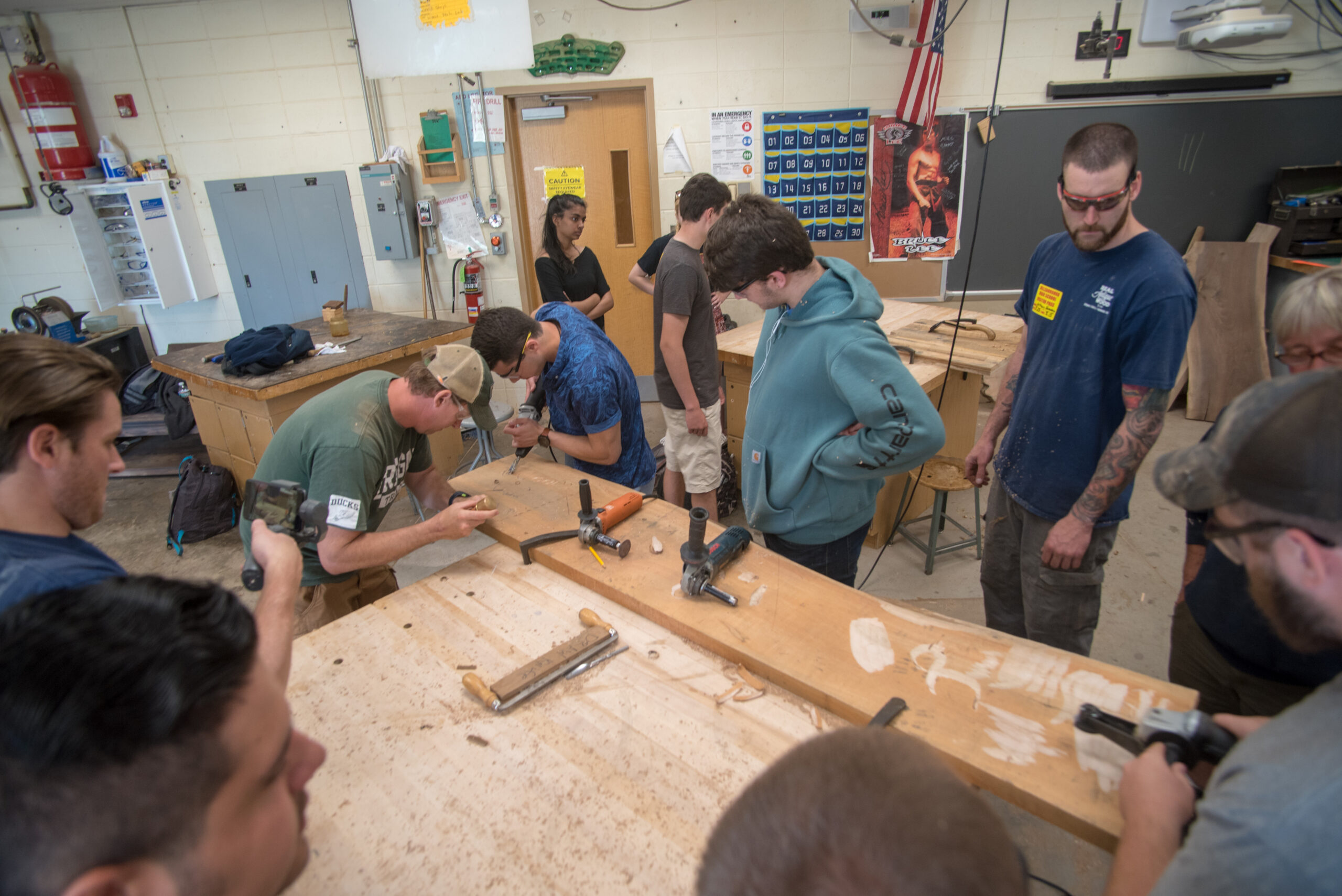Modern curricula throughout the United States generally leans closer to the technological side of things. Coding languages, web-based learning modules and lesson plans that incorporate cellphones are more likely to enter the classroom than older, more analog methods of learning.
Yet at Hillsborough High School, there’s at least one classroom where the high-tech gadgetry pupils are used to is not only left out of the learning experience, it’s outright banned: Eric Rosenthal’s woodshop.
“Asking for an answer from Siri or Google doesn’t help you,” Rosenthal, 43, said. “It’s really a tech-free class where you have no resources except for me, the machines and your own experience.”
That experience, and the efforts of Rosenthal and the students in his Woodshop 2 class, will hopefully pay off by the end of the school year, as a semester-long project will culminate in one of six handmade, “heirloom-quality” tables being selected for use in the Hillsborough Township Court Room.
Since October, groups of students in the woodshop class have been designing, pricing out and constructing their tables in an in-class competition, with the team whose table gets selected being the only one to get an A.
“Just like in the real world, not everyone wins,” Rosenthal said. “All these kids are vying for the client, which is Pam [Borek, Hillsborough Township clerk] and the mayor’s office.”
The project started back in October when the class took a field trip to the municipal building to see the courtroom and interview Borek to figure out what the township wanted in terms of style and functionality of the table.
Immediately following their visit to the municipal building, Rosenthal said the students went to Real Antique Wood in Irvington to pick up their materials and quickly got to work. The students not only had to know how to construct their tables, but also had to do a cost analysis on the final product, since they were required to stay within a $200 budget.
The potential end result, Rosenthal said, would be tables that would not only fit in the township’s judicial chambers, but also in a high-quality showroom.
“Beauty is in the eye of the beholder, but I believe these tables could fetch between $500 and $1,500 in the retail market.”
Borek said she had been in touch with Rosenthal over the years through various township committee proclamation presentations and became interested in working with him on a project. When the township needed a new table, she said they came up with the contest.
“I can’t wait to see the final product,” she said. “What an amazing opportunity for these kids…I can’t really say enough about how creative they are and how impressed I am with what they’ve come up with.”
Though the other tables will not be used by the township, Rosenthal said the remaining five will be displayed in the municipal building before they will be up for auction. The funds generated through their sale will go to the school’s wood tech department for materials and whatever else is needed.
“We go through a lot of the consumables, which is the wood and material, so if we can offset it by making projects to bring money in, that would really help with our budget so we can purchase what we need,” he said.
That added that funding could especially come in handy, since the program has grown exponentially over the last three years.
Prior to his leaving the physical education department to become the high school’s woodshop teacher, Rosenthal said the program generally had 67 to 70 students enrolled. Since taking over, he said that number has ballooned to roughly 140 to 150 kids, with even more trying to get in.
Though he admits that “99.9 percent of my students won’t become professional woodworkers,” Rosenthal said his classes teach kids more than just building birdhouses or boxes.
“The biggest functionality of woodshop is not creating pieces or making things to take home – it’s the ability for kids to solve problems,” Rosenthal said. “I tell the kids that you should fail every day – just don’t quit. You should be out there failing, making mistakes and learning how to make things better.”
On the same day as Borek’s visit to the woodshop class Thursday, Real Antique Wood held a two-hour demonstration on reclaimed wood, its place in the market and how to work with it. Rosenthal said the lumber mill would be looking for possible interns from his group of students.
The partnership with his class and the Irvington-based lumber mill will also result in Real Antique Wood donating reclaimed wood for the kids to work with next year.
At the end of the day, the former physical education teacher turned woodshop instructor said he was proud of the work that all six teams have put into their tables; that they and their peers in other woodshop classes at the high school were able to put their hands to something more than texting or tweeting; and that they were able to complete some hard, tangible work.
“We are a society of consumers. Very few kids like to take the initiative or risk of failing to make something their own and the work ethic has changed,” he said. “That’s just a societal shift in how we approach work, but I think classes like this give kids a glimpse into making things with their hands and give them a taste of experiencing something they never had before.”

